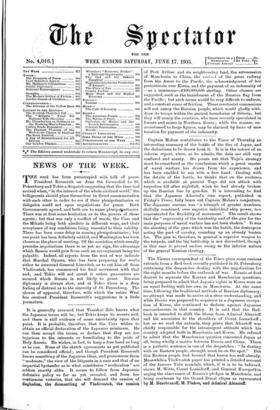The Vienna correspondent of the Times gives some curious extracts
front a Red-book recently published in St. Petersburg containing the despatches dealing with the negotiations for the eight months before the outbreak of war. Russia at first desired to separate the Korean and Manchurian questions, being prepared to admit that Japan's rights in Korea were on an equal footing with her own in Manchuria. At the same time, following the traditional methods of Russian diplomacy, no attempt was made to arrive at a clear understanding, and while Russia was prepared to acquiesce in a Japanese occupa- tion of Korea, she continued to declaim against Japanese encroachments in that country. It is said that the Red- book is intended to shift the blame from Admiral Alexeieff and his associates to the shoulders of Count Lamsdorff ; but as we read the extracts, they prove, that Alexeieff was chiefly responsible for the intransigent attitude' which his country adopted both in Manchuria and Korea. He refused to admit that the Manchurian question concerned Japan at all, being wholly a matter between Russia and China, There is a pathetic sentence in one of the despatches : "In dealing with an Eastern people, strength must be on the spot." But this Eastern people bad learned that lesson too well already. Meanwhile a Vladivostok paper has printed a detailed account of the famous -Yalu scandals, which, if it is to be believed, shows M. Witte, Count Lamsdorff, and General Kuropatkin urging the observance of Russia's pledges in Manchuria, and being overborne by the Grand Ducal clique as represented by M. Bezobrazoff; M. Plehve, and Admiral Alersieff.






































